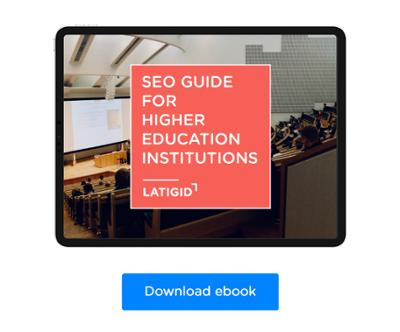
SEO for universities is key and good keyword research is a must. Understanding what keywords and phrases prospective students, researchers, and other stakeholders use when seeking information about universities is the first step toward creating compelling and relevant content that resonates with the audience.
Throughout this guide, we will take you on a journey through the crucial steps of conducting effective keyword research for universities. From defining your goals and understanding your target audience to expanding your keyword list with cutting-edge tools and techniques, we will equip you with the knowledge and skills to stay ahead in the digital landscape.
Definition of Keyword Research
Keyword research is the fundamental process of identifying and analyzing the specific words and phrases that users enter into search engines when looking for information, products, or services. In the context of online marketing and Search Engine Optimization (SEO), keyword research forms the backbone of content creation and optimization strategies. The aim is to discover the most relevant and valuable keywords related to a particular topic or industry, enabling businesses and institutions, such as universities, to align their online content with user intent.
The process of keyword research involves using various tools and techniques to understand the search volume, competition, and user behavior associated with specific keywords. By gaining insights into these factors, content creators and SEO specialists can tailor their website content and marketing efforts to target the right audience and improve their visibility on search engine results pages (SERPs).
Related article: SEO for Universities: How to Drive More Traffic to your Website
Why Keyword Research Matters for Universities
Keyword research holds significant importance for universities due to the following reasons:
Enhanced Visibility and Organic Traffic
When universities conduct thorough keyword research, they can optimize their website content, including landing pages, blog posts, and program descriptions, with relevant keywords. This optimization helps search engines understand the content's context and purpose, leading to higher rankings on SERPs. Improved rankings translate to increased organic traffic to the university's website, exposing them to a broader audience.
Targeting Prospective Students
Prospective students actively search for universities and academic programs online. By identifying the specific keywords these students use in their search queries, universities can tailor their content to match their interests and needs. This enables universities to be more visible to potential applicants and attract qualified leads to their website.
Relevance to User Intent
Keyword research allows universities to align their content with user intent. Understanding what users are searching for helps universities provide relevant and valuable information, improving the overall user experience. Content that matches user intent is more likely to rank higher on search engines and lead to increased engagement and conversions.
Competitive Advantage
Keyword research enables universities to gain insights into their competitors' strategies and identify untapped opportunities. By targeting less competitive but highly relevant keywords, universities can carve a niche for themselves and compete effectively within their academic domains.
Content Strategy and Optimization
Keyword research serves as the foundation for an effective content strategy. It guides content creation, ensuring that topics are chosen based on user demand and interest. Additionally, keywords are strategically incorporated into content, meta tags, and headings, signaling to search engines the relevance and value of the material.
Adapting to Evolving Trends
Keyword research is not a one-time task; it requires continuous monitoring and adaptation. Universities can stay updated on changing search trends, student preferences, and industry developments by regularly conducting keyword research. This agility allows them to modify their content and marketing strategies to remain relevant and competitive.
Steps to Conduct Effective Keyword Research
Keyword research is a critical component of any successful SEO strategy, including those tailored for universities. By understanding the process of conducting effective keyword research, universities can optimize their online content, attract relevant traffic, and connect with their target audience more effectively. Here are the steps to conduct comprehensive keyword research:
Defining Goals and Objectives
The first step in keyword research is to clearly define the goals and objectives of the university's digital marketing efforts. This involves understanding what the university aims to achieve through its online presence. For example, the goals could be increasing student enrollment, promoting specific academic programs, attracting research partnerships, or enhancing brand awareness. Defining these objectives will help in identifying the most relevant and valuable keywords to target.
Identifying Target Audience
Knowing the target audience is crucial for effective keyword research. Universities need to understand who their potential students, researchers, and other stakeholders are. Demographic information, interests, and preferences play a vital role in determining the keywords that resonate with the target audience. Conducting surveys, analyzing website analytics, and utilizing social media insights can aid in understanding the audience better.
Generating Seed Keywords
Seed keywords are the foundation of keyword research. These are the initial set of keywords directly related to the university's offerings, such as academic programs, research areas, or campus facilities. Brainstorming and listing down relevant seed keywords is a useful starting point for the research process.
Expanding Keyword List with Tools and Techniques
To expand the keyword list beyond seed keywords, universities can employ various tools and techniques. Keyword research tools like Google Keyword Planner, SEMrush, Ahrefs, and Moz Keyword Explorer provide valuable insights into search volume, related keywords, and keyword suggestions. These tools help discover long-tail variations, question-based keywords, and popular search queries relevant to the university's offerings.
Content brainstorming sessions, competitor analysis, and exploring related searches on search engines are additional techniques that can uncover hidden keyword opportunities.
Analyzing Keyword Difficulty and Competition
Not all keywords are equally easy to rank for. Keyword difficulty refers to the level of competition a keyword faces in the search results. Universities need to evaluate the difficulty of each keyword to understand whether they can realistically compete for the top positions.
Keyword research tools often provide a keyword difficulty metric. Alternatively, analyzing the current top-ranking pages for specific keywords and assessing their authority, backlink profile, and content quality can give an indication of the competition level.
Prioritizing Keywords for University Content
Once a comprehensive list of keywords is generated and analyzed, it's time to prioritize them based on their relevance and potential impact on the university's goals and objectives. High-volume, low-competition keywords with strong relevance to the target audience should be prioritized for content creation and optimization.
Additionally, universities can categorize keywords based on the stages of the student journey (awareness, consideration, decision) and tailor content accordingly. For example, keywords related to "scholarships" might be targeted for attracting prospective students, while "faculty research expertise" keywords could be focused on building the university's reputation among academic peers.
Related article: Why Competitor Analysis is Crucial for Higher Education SEO
Common Keyword Research Mistakes to Avoid
Keyword research is a crucial aspect of any successful SEO strategy, but it's not without its pitfalls. Avoiding these common keyword research mistakes can help universities optimize their online content and connect with their target audience more effectively.
Relying on Generic Keywords
One of the most prevalent mistakes in keyword research is relying solely on generic, broad keywords. While these keywords may have high search volumes, they often face fierce competition, making it difficult for universities to rank well for them. Additionally, generic keywords may not always align with the specific goals and offerings of the university.
Instead, universities should focus on long-tail keywords that are more specific and targeted. Long-tail keywords may have lower search volumes, but they are often more relevant to the university's content and are likely to attract more qualified traffic.
Ignoring Local Keywords
Universities often serve specific geographic regions, and ignoring local keywords is a missed opportunity. Local keywords include city or region-specific terms and phrases that potential students and stakeholders may use when searching for educational institutions in their area.
By optimizing for local keywords, universities can improve their visibility in local search results, enhance their relevance to local audiences, and attract students from the surrounding community.
Overlooking User Intent
Failing to consider user intent is a critical mistake in keyword research. User intent refers to the specific goal or information that a user is seeking when entering a particular search query. Understanding user intent is essential because search engines aim to provide users with the most relevant results.
If a university's content does not align with user intent, it may lead to high bounce rates and low engagement, signaling to search engines that the content is not meeting users' needs. To avoid this, universities should analyze search intent for each keyword and ensure their content addresses the user's query effectively.
Keyword Stuffing and Spammy Practices
Keyword stuffing, the practice of overloading content with excessive keywords in an attempt to manipulate search rankings, is a serious mistake that can lead to penalties from search engines. Search engines are now sophisticated enough to recognize and penalize websites engaging in spammy practices.
Instead of keyword stuffing, universities should focus on creating high-quality, valuable content that incorporates keywords naturally and contextually. The content should provide relevant and meaningful information to the audience, satisfying their search intent.
A balanced approach to keyword usage, where keywords are strategically placed in titles, headings, meta tags, and content, is more effective for SEO and user experience.
In conclusion, keyword research is not merely a technical aspect of SEO for universities—it is the key to unlocking their digital potential. By prioritizing user intent, relevance, and value in their keyword strategy, universities can navigate the ever-changing digital space with confidence and create meaningful connections with their audience. Embracing the power of effective keyword research ensures that universities are not just discovered by their audience but are valued and appreciated as authoritative sources of knowledge and education.
Related article: Increasing Student Enrollment: SEO Techniques for Universities
About Latigid
We are a Higher Education Marketing Agency, specializing in SEO. We help you grow by increasing website traffic, generating more student leads, and closing those leads into enrollment. With a deep understanding of the latest industry trends and best practices, we are well equipped to help your institution grow.
If you are looking for a Higher Education Marketing Agency to partner with, check our page to see what we can do for you!
Download our SEO guide and learn how to build a strategy to optimize your Higher Education Institution's website




